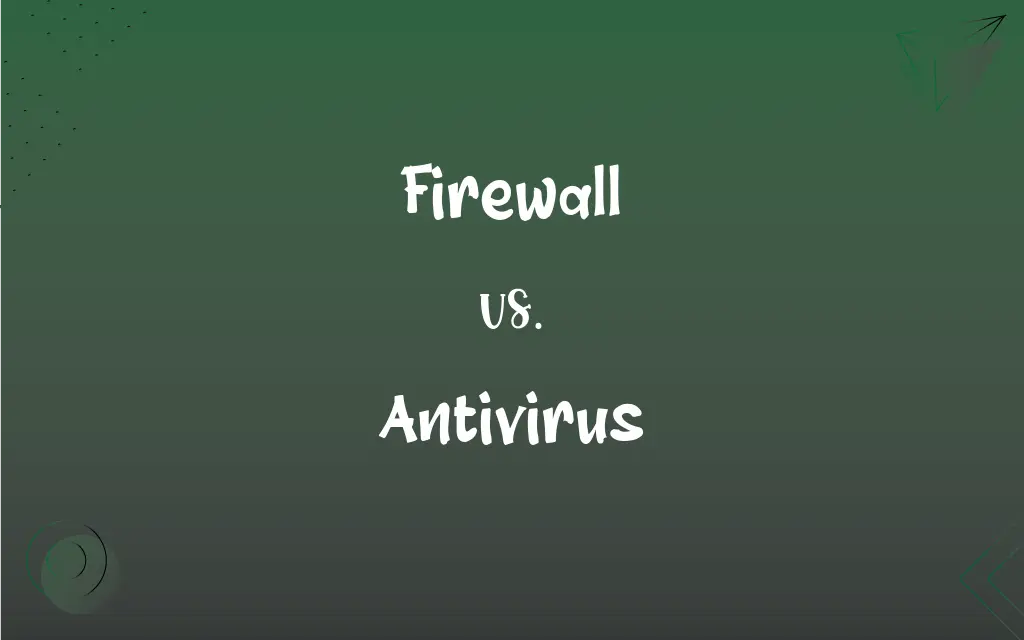Firewall vs. Antivirus: What's the Difference?
Edited by Aimie Carlson || By Harlon Moss || Updated on October 27, 2023
A firewall controls incoming and outgoing network traffic based on predetermined rules, while an antivirus detects, blocks, and removes malicious software from a system.

Key Differences
A firewall, fundamentally, is a network security device or software designed to monitor, filter, and control the flow of traffic to and from a network. In contrast, an antivirus is a software program crafted to identify, counteract, and eradicate malicious software, commonly referred to as malware, from a computer or network.
When discussing their functions, a firewall acts as a barrier between a trusted network and an untrusted network, such as the internet. It uses defined rules to allow or disallow specific traffic types. On the other hand, an antivirus actively scans files and programs on a computer, searching for patterns known to match malware signatures.
From an implementation perspective, firewalls can be hardware-based, software-based, or a combination of both. They might be set up at the perimeter of a network or on individual devices. Antivirus software, conversely, primarily resides and runs on individual devices, ensuring they are free from harmful software.
Furthermore, while both tools aim to protect, they operate at different levels. Firewalls primarily handle external threats, regulating traffic based on pre-established security policies. Antivirus programs, meanwhile, deal with internal threats, ensuring that the stored data and executed programs on a computer are not malicious.
In sum, though both firewalls and antivirus tools are integral to comprehensive cybersecurity, they have distinct roles. A firewall focuses on traffic regulation, serving as a gatekeeper for network access. In contrast, an antivirus targets and eliminates malware that might have infiltrated the system.
ADVERTISEMENT
Comparison Chart
Primary Function
Monitors and controls network traffic
Detects and removes malicious software
Operation Level
Network level
Device or system level
Types
Hardware, software, or both
Software
Protection Against
Unauthorized access, cyber threats
Malware like viruses, trojans, worms
Example
Restricting access to specific websites
Detecting a ransomware attack
ADVERTISEMENT
Firewall and Antivirus Definitions
Firewall
A barrier against unauthorized network access.
To safeguard our data, we implemented a robust firewall.
Antivirus
A tool preventing, detecting, and removing malware.
Regular antivirus scans keep the system clean.
Firewall
A filter for incoming and outgoing data packets.
The firewall inspects packets to ensure no malware enters the network.
Antivirus
A solution for identifying and neutralizing malware patterns.
The antivirus software quarantined a file with a known virus signature.
Firewall
A network security system controlling traffic.
The company's firewall blocked access to social media sites.
Antivirus
A software detecting malicious programs.
My antivirus alerted me to a suspicious file on my computer.
Firewall
A defense line between trusted and untrusted networks.
The firewall acts as a buffer between the internal network and the internet.
Antivirus
A program safeguarding devices against cyber threats.
To ensure online safety, always have an up-to-date antivirus.
Firewall
A tool applying predetermined traffic rules.
The firewall was configured to deny traffic from certain IP addresses.
Antivirus
A defense mechanism against harmful software intrusions.
The antivirus blocked multiple potential threats last week.
Firewall
A fireproof wall used as a barrier to prevent the spread of fire.
Antivirus
Of or relating to a software program designed to identify and remove known or potential computer viruses.
Antivirus
(computing) A piece of software that is used to detect, delete and or neutralize computer-based viruses.
FAQs
What is the primary function of a firewall?
A firewall controls network traffic based on predetermined rules.
How often should I update my antivirus?
Regularly, as updates include new malware signatures for detection.
Can a firewall detect viruses?
Typically, a firewall focuses on traffic control, not virus detection.
Is it necessary to have both firewall and antivirus?
Yes, they offer complementary protection: firewalls for traffic, antiviruses for files.
Does antivirus slow down a computer?
It can, depending on system resources and the antivirus software's demands.
What's a zero-day vulnerability, and can firewalls protect against it?
It's a previously unknown vulnerability; firewalls may offer some protection, but they're not infallible.
Should firewalls be updated?
Yes, to ensure they're equipped to tackle the latest threat landscape.
How does an antivirus protect a computer?
An antivirus detects, blocks, and removes malicious software.
What is real-time scanning in antivirus?
It continuously monitors computer activity for malware threats.
Do firewalls have any limitations?
They can't protect against threats originating inside the network or threats they're not configured to recognize.
Can antiviruses detect spyware?
Many modern antiviruses can detect a broad range of threats, including spyware.
Can a firewall protect against phishing?
Not directly. Firewalls control traffic, while awareness and email filters help counteract phishing.
What's the difference between a virus and malware?
All viruses are malware, but not all malware are viruses; malware is a broader category.
Is having an antivirus alone enough for full protection?
No, comprehensive security includes antivirus, firewall, and other measures.
What's a software firewall vs. a hardware firewall?
Software firewalls are installed on devices; hardware firewalls are physical devices guarding network perimeters.
How does a firewall differentiate safe from unsafe traffic?
By using defined rules specifying allowed and blocked traffic types.
Should I set up a firewall for my home network?
Yes, it adds an extra layer of security against potential threats.
How does an antivirus recognize threats?
Through malware signatures, heuristic analysis, and behavior-based detection.
Can firewalls protect against hackers?
They can block unauthorized access, but no system is entirely hacker-proof.
Do I need an antivirus for my smartphone?
Yes, mobile devices can also be targeted by malware.
About Author
Written by
Harlon MossHarlon is a seasoned quality moderator and accomplished content writer for Difference Wiki. An alumnus of the prestigious University of California, he earned his degree in Computer Science. Leveraging his academic background, Harlon brings a meticulous and informed perspective to his work, ensuring content accuracy and excellence.
Edited by
Aimie CarlsonAimie Carlson, holding a master's degree in English literature, is a fervent English language enthusiast. She lends her writing talents to Difference Wiki, a prominent website that specializes in comparisons, offering readers insightful analyses that both captivate and inform.































































